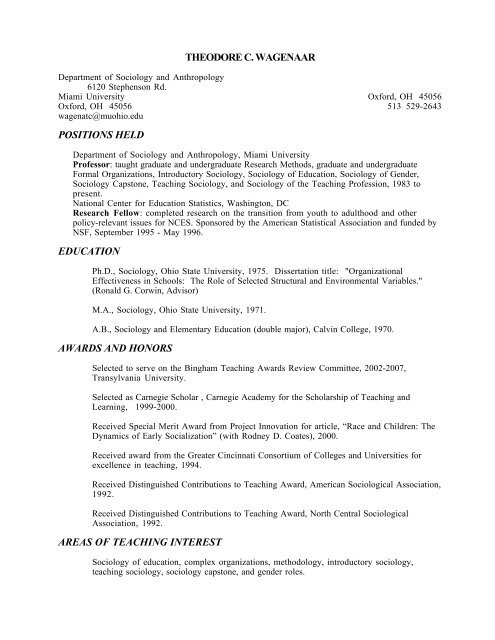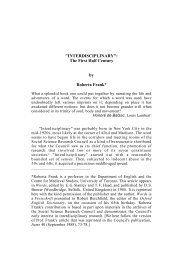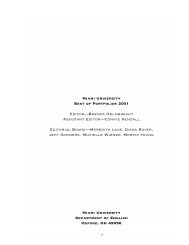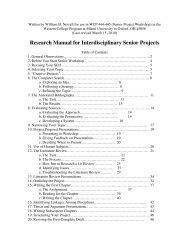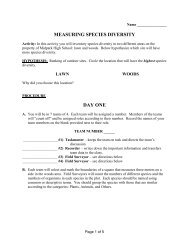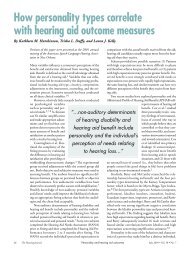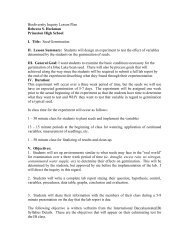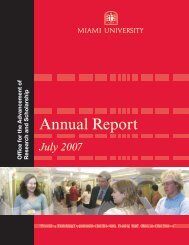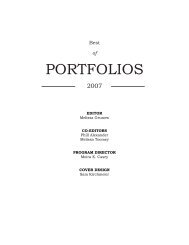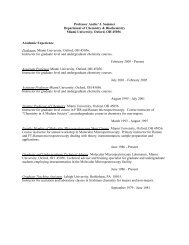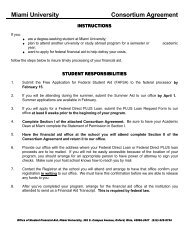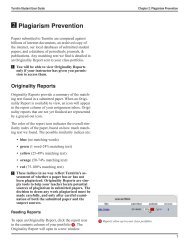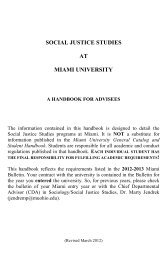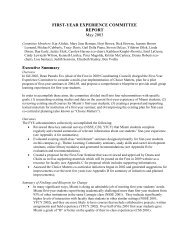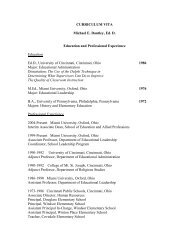theodore c. wagenaar positions held education ... - Units.muohio.edu
theodore c. wagenaar positions held education ... - Units.muohio.edu
theodore c. wagenaar positions held education ... - Units.muohio.edu
You also want an ePaper? Increase the reach of your titles
YUMPU automatically turns print PDFs into web optimized ePapers that Google loves.
THEODORE C. WAGENAAR<br />
Department of Sociology and Anthropology<br />
6120 Stephenson Rd.<br />
Miami University Oxford, OH 45056<br />
Oxford, OH 45056 513 529-2643<br />
wagenatc@<strong>muohio</strong>.<strong>edu</strong><br />
POSITIONS HELD<br />
Department of Sociology and Anthropology, Miami University<br />
Professor: taught graduate and undergraduate Research Methods, graduate and undergraduate<br />
Formal Organizations, Introductory Sociology, Sociology of Education, Sociology of Gender,<br />
Sociology Capstone, Teaching Sociology, and Sociology of the Teaching Profession, 1983 to<br />
present.<br />
National Center for Education Statistics, Washington, DC<br />
Research Fellow: completed research on the transition from youth to adulthood and other<br />
policy-relevant issues for NCES. Sponsored by the American Statistical Association and funded by<br />
NSF, September 1995 - May 1996.<br />
EDUCATION<br />
Ph.D., Sociology, Ohio State University, 1975. Dissertation title: "Organizational<br />
Effectiveness in Schools: The Role of Selected Structural and Environmental Variables."<br />
(Ronald G. Corwin, Advisor)<br />
M.A., Sociology, Ohio State University, 1971.<br />
A.B., Sociology and Elementary Education (double major), Calvin College, 1970.<br />
AWARDS AND HONORS<br />
Selected to serve on the Bingham Teaching Awards Review Committee, 2002-2007,<br />
Transylvania University.<br />
Selected as Carnegie Scholar , Carnegie Academy for the Scholarship of Teaching and<br />
Learning, 1999-2000.<br />
Received Special Merit Award from Project Innovation for article, “Race and Children: The<br />
Dynamics of Early Socialization” (with Rodney D. Coates), 2000.<br />
Received award from the Greater Cincinnati Consortium of Colleges and Universities for<br />
excellence in teaching, 1994.<br />
Received Distinguished Contributions to Teaching Award, American Sociological Association,<br />
1992.<br />
Received Distinguished Contributions to Teaching Award, North Central Sociological<br />
Association, 1992.<br />
AREAS OF TEACHING INTEREST<br />
Sociology of <strong><strong>edu</strong>cation</strong>, complex organizations, methodology, introductory sociology,<br />
teaching sociology, sociology capstone, and gender roles.
PROFESSIONAL AFFILIATIONS<br />
American Sociological Association<br />
Section on Teaching and Learning<br />
Section on Technology and Society<br />
North Central Sociological Association<br />
Midwest Sociological Society<br />
JOURNAL EDITORSHIPS<br />
Editorial Board Member, Journal on Excellence in College Teaching, 2002-2004.<br />
Editorial Board Member, The Teaching Professor, 1991-1997.<br />
OFFICES HELD<br />
Member, Graduate Student Paper Award Committee, Midwest Sociological Society, 2003.<br />
Chair, Section on Computers and Sociology Section of the American Sociological Association,<br />
2001-2002.<br />
Chair, Distinguished Contributions to Teaching Award Committee of the American Sociological<br />
Association, 2001-2002, member 2000-2002.<br />
Program Committee, Midwest Sociological Society, 1999-2000, 1995-1996, 1994-1995.<br />
Member, Teaching Committee, North Central Sociological Association, 1998-2000, 2002-2004.<br />
GRANTS<br />
Research Fellow, National Center for Education Statistics, sponsored by the American Statistical<br />
Association and funded by the National Science Foundation, 1995-1996, $90,000.<br />
PUBLICATIONS<br />
Books<br />
Study Guide for Babbie’s The Basics of Social Research, Wadsworth, 2 nd edition, 2002, and<br />
1 st edition, 1999 (T. Wagenaar and E. Babbie).<br />
Practicing Social Research, student workbook for tenth edition of Babbie's The Practice of<br />
Social Research, Wadsworth, 2004 (T. Wagenaar and E. Babbie). Also ninth edition, 2000,<br />
eighth edition, 1997, seventh edition, 1995, sixth edition, 1992, fifth edition, 1988, fourth<br />
edition, 1986, and third edition, 1983.<br />
Teaching Sociology of Education, fifth edition, edited volume with essay, American<br />
Sociological Association, 2000, (J. Ballantine, J. Dixon, F. Hammack, E. King, C. Persell, and<br />
T. Wagenaar). Also fourth edition, 1996, second edition, 1988, and first edition, 1984.<br />
The Capstone Course in Sociology, edited volume with introductory essay, American<br />
Sociological Association, 2 nd edition, 1997, 1 st edition, 1993.
Book Chapters<br />
“Survey Design,” in International Encyclopedia of Social Measurement, Academic Press,<br />
2004.<br />
“Interview with Theodore C. Wagenaar,” 9pp. in Voices From the Classroom: Interviews with<br />
Thirty-Six Sociologists About Teaching, American Sociological Association, 1996.<br />
"Sociology of Education," Pp. 1939-1945 in Survey of Social Sciences: Sociology, edited by<br />
F. Magill. Salem Press. 1994.<br />
"What Do We Know About High School Dropouts?" Pp. 161-190 in Research in the<br />
Sociology of Education and Socialization, Volume 7: Out of School, edited by R. Corwin. JAI<br />
Press. 1987.<br />
Articles/Notes<br />
“Assessing Sociological Knowledge: A First Try,” Teaching Sociology, 2004.<br />
“Is There a Core in Sociology? Results From a Survey,” Teaching Sociology, 2004.<br />
“Core as Science or Core as Major? Impediments to Identifying a Core,” Teaching Sociology,<br />
2004.<br />
“Sociology and a General Understanding of Social Life,” Teaching Sociology, 2004 (T.<br />
Wagenaar, B. Keith, and M. Ender).<br />
“Outcomes Assessment in Sociology: Prevalence and Impact,” Teaching Sociology, October,<br />
2002: 403-413.<br />
“Deep Learning Across the Sociology Curriculum,” Michigan Sociological Review, Fall,<br />
2001:1-9.<br />
"The Nature of the Course," in Teaching the Sociology of Education, fifth edition, J.<br />
Ballantine, J. Dixon, F. Hammack, E. King, C. Persell, and T. Wagenaar (eds.), American<br />
Sociological Association, 2000:7-13. Also fourth edition, 1997, second edition, 1988, and<br />
first edition, 1984.<br />
“Race and Children: The Dynamics of Early Socialization,” Education, Winter, 1999:220-<br />
236 (T. Wagenaar and R. Coates).<br />
Newspaper Articles<br />
Cited in an article, “Find Dining: Small Towns’ Big Challenge,” Cincinnati Enquirer,<br />
November 26, 2001.<br />
Electronic Media<br />
Practice Quizzes for Babbie’s Research Writer CD-ROM, Wadsworth, 2004.<br />
Web tutorials for Babbie’s The Practice of Social Research, Wadsworth, 2004.<br />
PRESENTATIONS AT PROFESSIONAL MEETINGS<br />
Research (teaching and curriculum topics noted below)
“Sociological Community in a Special Interest Chat Forum,” American Sociological<br />
Association, August, 2003.<br />
“Race Differences in Early Childhood Experiences: Home and School,” Midwest Sociological<br />
Society, April, 1999.<br />
“Educational and Social Correlates of Early Sexual Experiences,” North Central Sociological<br />
Association, April, 1999.<br />
“Gender Differences in Childhood Socialization,” American Sociological Association, August,<br />
1997.<br />
“The School Experiences of Adolescents: A Focus on Gender,” North Central Sociological<br />
Association, April, 1997.<br />
“Who Has Sex How Often?”, Midwest Sociological Society, April, 1997.<br />
Teaching, Curriculum, and Higher Education<br />
WORKSHOPS<br />
“Assessing Sociological Knowledge: A First Try,” American Sociological Association, August,<br />
2003.<br />
“Teaching Effective Writing,” International Conference on Faculty Learning Communities,<br />
June, 2003.<br />
“Curriculum Structures and Deep Learning in Sociology,” Midwest Sociological Society, April,<br />
2003.<br />
“Student Writing Coaches: An Example from Sociology of Gender,” North Central<br />
Sociological Association, April, 2003 (with Yady King).<br />
“Peer Review of Teaching,” Lilly Conference on College Teaching, November, 2002.<br />
“Institutionalizing Teaching Excellence: The Bingham Program for Excellence in Teaching<br />
at Transylvania University,” session organizer and presenter, Lilly Conference on College<br />
Teaching, November, 2002.<br />
“Is There a Core in Sociology? Results From a Survey,” American Sociological Association,<br />
2002.<br />
“Deep Learning and the Sociology Curriculum,” XV World Congress of Sociology, 2002.<br />
“Deep Learning Across the Sociology Curriculum,” poster session at annual meeting of<br />
American Association for Higher Education, April, 2002.<br />
“Undertaking Effective Program Reviews,” Department Resources Group of the American<br />
Sociological Association, August, 2003.<br />
“Some of the Things You Have Always Wanted to Know About Assessment,” workshop co-leader,<br />
American Sociological Association, August, 2003.<br />
“The Capstone Course in Sociology,” workshop co-leader, American Sociological Association,<br />
2002.
“Preparing for and Surviving Program Review,” workshop co-leader, American Sociological<br />
Association, 2002.<br />
“Assessing Undergraduate Learning in Sociology,” American Sociological Association, August,<br />
2000 (with K. Roberts, S. Steele, and D. Gordon).<br />
“Student Evaluation of Teaching: What We Know and How to Do It,” Santa Fe Community<br />
College, April, 2000.<br />
“Student Evaluation of Teaching: What We Know and How to do It,” Michigan State University,<br />
March, 2000.<br />
OTHER PROFESSIONAL ACTIVITY<br />
Task Force Member, Implications of Assessing Faculty Productivity and<br />
Effectiveness, American Sociological Association, 2000-2002.<br />
Teaching<br />
Project member, Peer Collaboration, American Sociological Association, 1997-1999.<br />
5


